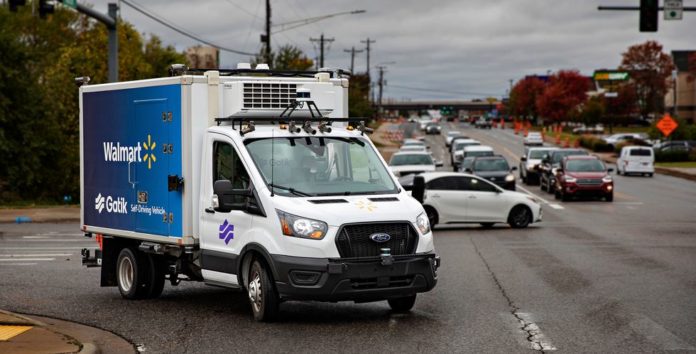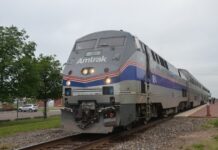A bill that that would clear the way for retailer Walmart to employ driverless delivery trucks is running into a hitch as opposition builds against the legislation.
Republican state Sen. Mike Petersen, chair of the Senate Transportation Committee, said he wouldn’t move the bill without adding more safety measures and placing weight limits on the trucks that would be deployed.
Petersen asked parties on both sides of the proposal to work together to craft a compromise bill for the committee to consider.
“It is a new technology and in Kansas, we walk before we run,” Petersen said in an interview.
Petersen said the bill – as it’s now written – would not come out of committee.
“I do know that I probably would not let this bill go out unless there was a minimum of driver’s safety training and weight limits.”
The Wichita senator said there’s a lot more work to be done on the legislation, but didn’t see why an agreement couldn’t be reached.
“It can happen if they want to make it happen,” Petersen said.
Petersen’s Senate committee held three days of hearings on the bill, including two days that were set aside for opponents and anyone who was neutral but still had reservations.
Opponents argued that the two-page bill lacks important safeguards needed to deploy the technology that is still in its infancy.

“While it is completely understandable to keep this bill short and sweet, it’s important to make sure that it contains basic checks and balances so that it does not need revisited in a hurry if conditions change or something goes wrong on the road,” said Philip Koopman, who studies autonomous vehicles at Carnegie Mellon University.
Walmart is partnering with Gatik, a transportation technology company based in Palo Alto, California, to deploy a driverless fleet of box trucks that would deliver goods from a warehouse to a retail outlet in Kansas
The driverless vehicles, traveling along fixed, repeatable routes, would still be subject to local traffic laws, but local governments would be barred from outlawing them in their community.
The vehicles would have to comply with federal law and federal motor carrier safety standards. They also would need to be insured. And the remote operator of the vehicle would have to be licensed.
Gatik claims a clean safety record in the locations where its vehicles now operate in Louisiana and Arkansas as well as in Texas, where the Silicon Valley startup has an autonomous trucking hub that operates 20 hours a day, every day in Fort Worth.
But lawmakers are being asked to ensure accountability of the vehicles, whether that means requiring a safety driver in the truck, imposing new insurance requirements or establishing safety standards that the vehicles would have to meet.
There also have been suggestions of a pilot program for testing the project.
And there also have been questions raised about whether the bill clearly defines who would be held responsible for traffic infractions or, worse, a traffic fatality or injury.
“The companies developing this technology are saying, ‘trust us,’ but trust depends on accountability,” said Daniel Hinkle, who testified against the bill on behalf of the Kansas Trial Lawyers Association.
“We all want to trust Gatik. We all want to trust in companies promising this technology that it’s going to be safe,” Hinkle said.
“To earn that trust, they need to be accountable for the promises that they make,” he said. “If no one is accountable, nobody is safe.”
Koopman, for instance, has recommended requiring autonomous vehicle operators to meet a certain level of safety by reporting data to show whether they are complying.
He also has suggested that the Transportation Department be given the authority to pause the program in the event of a crash or other concerns about public safety.
Ed Klumpp, who lobbies for Kansas sheriffs, struggled with how the legislation defines the owner of the vehicle and who is responsible for its operation.
He testified as a neutral, but said the bill is worded in a way that it allows the owner to determine whether there is a violation of the law and an ensuing penalty.
He notes the bill defines the operator of the delivery truck as the owner of the automated driving system, which is the hardware and software installed on the vehicle.
The owner isn’t necessarily the owner of the vehicle, he said, it’s the owner of the system.
“When you get down into the technicalities of this subsection, it’s so murky and muddy, we are not confident that we can perform the duties you expect us to perform in ensuring safety on the highways of all the citizens in Kansas,” he said.
Hinkle raised the same issue.
He pointed out that bill says the owner of the automated driving system is considered the driver solely for the purpose of assessing compliance with traffic laws.
And the automated driving system is defined as the hardware and software that drives the truck.
“What if the person with legal title to the vehicle is different than the person with a right of
control over the automated driving system?” Hinkle asked.
“Under this bill, it is unclear who is responsible for safely complying with the rules of the road,” Hinkle said.
“Who is the driver of an automated vehicle? Unfortunately, SB 379 is very vague.”
Klumpp also questioned how law enforcement could serve a traffic citation to the owner of the driverless vehicle.
“Does this make any violation of the traffic laws by an autonomous vehicle a civil penalty instead of a criminal penalty under the traffic code?” he asked in written testimony.
“If so, where is the civil process for doing this in the law?” he said. “Wouldn’t we need to identify the individual responsible for the operation of the vehicle whether they were in the vehicle or operating it remotely?”
The Kansas Highway Patrol also was neutral on the bill but flagged a section that keeps local governments from outlawing the technology in their community.
“Many municipalities have truck routes that are established and enforced by local ordinance,” Highway Patrol Superintendent Herman Jones said in written testimony.
“These routes help to alleviate traffic congestion and increase the safety of the motoring public,” he said.
The language in the bill, he said, may impact traffic flow patterns around certain municipalities.
“In this regard, we believe some consideration should be given to local law enforcement agencies,” he said.















